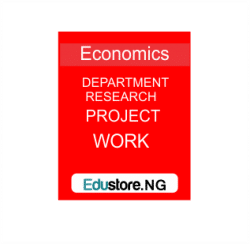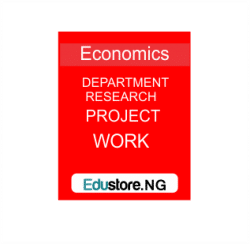ABSTRACT
This study aims to evaluate the oil sector and the agricultural sector in Nigeria from 1981 to 2011. The role of agriculture in the Nigerian society has been very important, even in the pre-colonial era. The attractiveness of the Nigerian agricultural sector to the colonialist formed largely on the basis for the development of the railway system north of the coast through the east and west of the country since it was the need to evacuate agricultural products from the hinterland to the coast for shipment onward to Europe as raw material to supply the British industries. The agricultural sector used to be the mainstay of the Nigerian economy. It provided for the nation, generated revenues and foreign exchange earnings to the government, provided the raw materials for industry, generated employment and has contributed more than 50% of gross domestic product (GDP). This took place until the 1970s, when the oil sector came and took the Agriculture relay so that there was a rapid decline in agricultural output. Nigeria became exclusively dependent on the oil sector for its revenues such as policies that were made were generally in favor of the oil sector. This obviously leads to the neglect of the agricultural sector as all focus are on the oil sector. This research aims to determine the relationship between the oil sector and the agricultural sector, the impact of oil and the effects of exchange rates on the agricultural sector and to find ways to solve the problem, and make recommendations that can make positive changes.
- For Reference Only: Materials are for research, citation, and idea generation purposes and not for submission as your original final year project work.
- Avoid Plagiarism: Do not copy or submit this content as your own project. Doing so may result in academic consequences.
- Use as a Framework: This complete project research material should guide the development of your own final year project work.
- Academic Access: This platform is designed to reduce the stress of visiting school libraries by providing easy access to research materials.
- Institutional Support: Tertiary institutions encourage the review of previous academic works such as journals and theses.
- Open Education: The site is maintained through paid subscriptions to continue offering open access educational resources.




